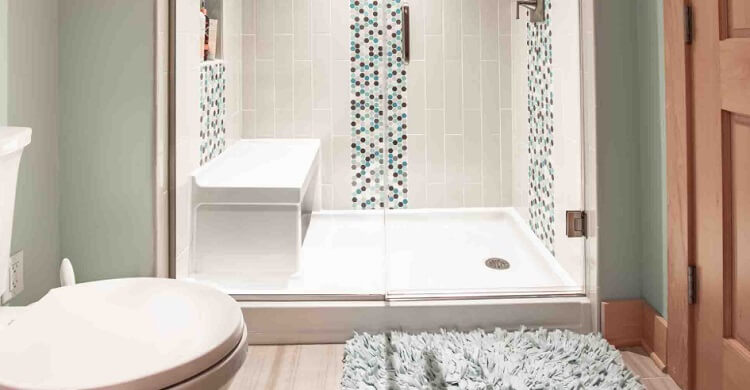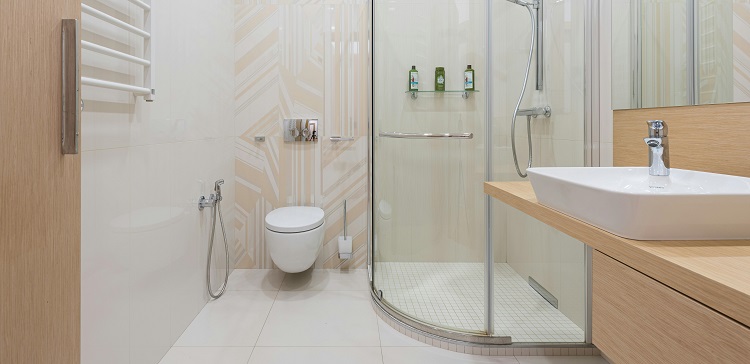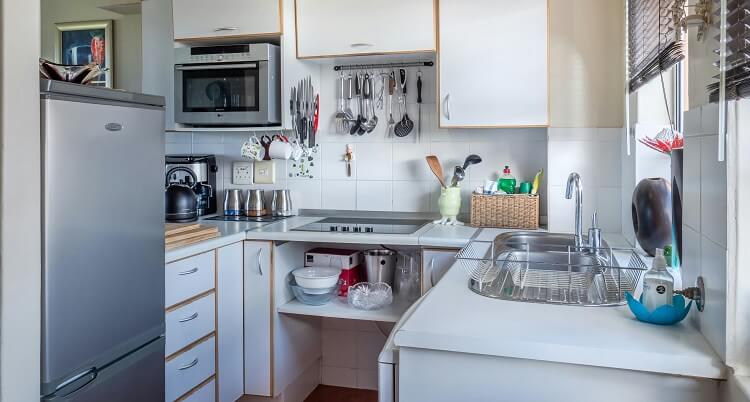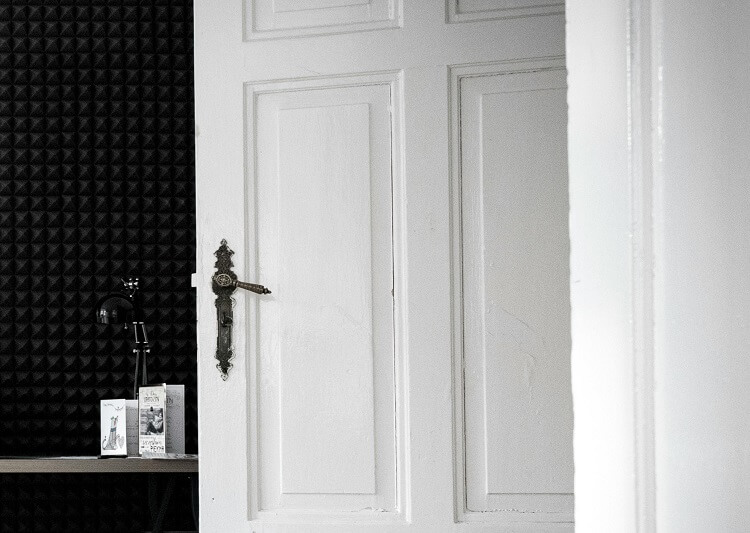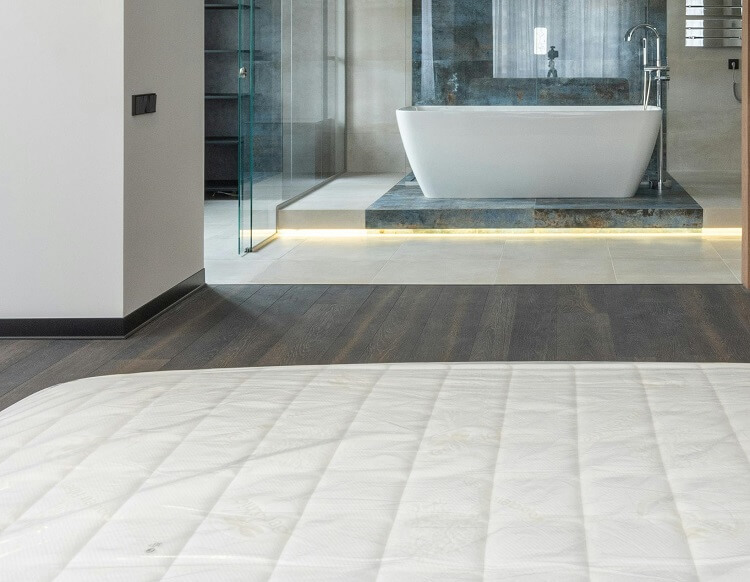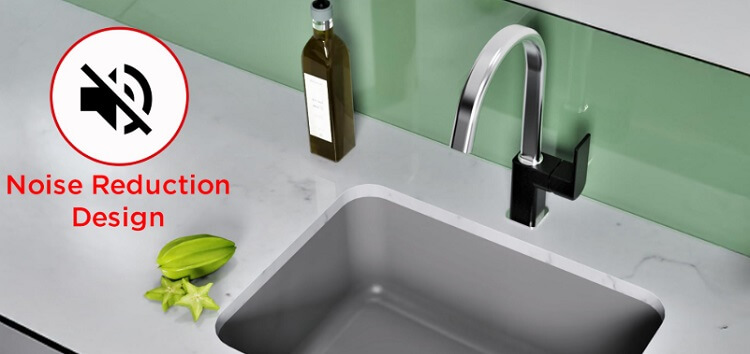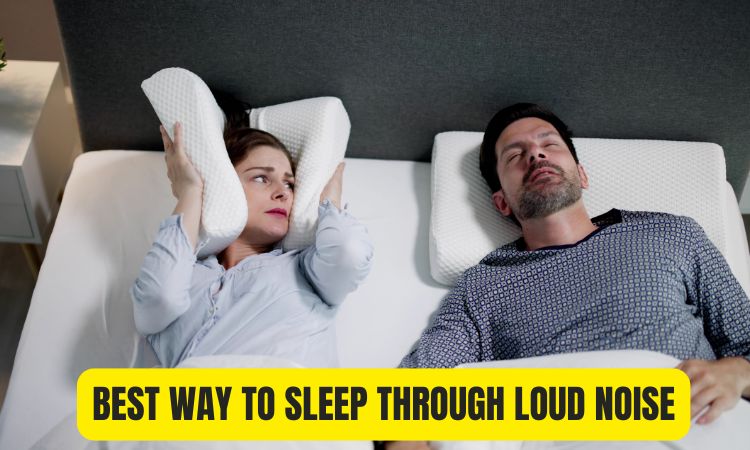
Achieving a good night’s sleep can feel impossible when loud noises disrupt your peace. From bustling urban areas to noisy neighbors, external disturbances can wreak havoc on your rest. This guide provides practical solutions, informed by sleep research and practical experience, to help you sleep soundly, no matter the noise level.
Let’s explore techniques that can transform your nights into truly restful experiences, including identifying noise sources, utilizing noise-blocking solutions, and incorporating mindfulness strategies.
Why Noise Disrupts Sleep
Sleep is a crucial time for the body to recharge, and noise significantly disrupts this process. Understanding how noise impacts your rest can motivate you to take action:
Increases Stress
Prolonged exposure to noise can raise cortisol levels, a stress hormone, making relaxation and falling asleep much harder. Chronically elevated cortisol can lead to persistent fatigue, increased irritability, and a weakened immune system.
Interrupts Sleep Cycles
Noise acts as an external stimulus that can cause frequent awakenings, even if you don’t fully remember them. These disruptions prevent you from progressing through the natural stages of sleep, particularly the deeper stages like slow-wave sleep and REM (Rapid Eye Movement) sleep, which are vital for cognitive function, memory consolidation, and emotional regulation.
Reduces Sleep Quality
Even if you remain asleep despite the noise, it can still negatively impact the restorative nature of your rest. Studies have indicated that even low-frequency noises, such as distant traffic rumble, can subtly disturb sleep architecture without fully arousing you, leading to less refreshing sleep.
Scientific Evidence
According to a study published in the journal “Sleep Medicine” in 2018, which focused on the effects of nocturnal environmental noise, exposure to noise levels above 35 decibels during the night significantly disrupts sleep architecture and reduces sleep quality.
Addressing noise disturbances is therefore essential to ensure your body and mind get the uninterrupted rest needed to function optimally, significantly improving your overall quality of life, mood, and health.
Identify and Minimize Noise Sources
Before implementing sound dampening, it’s crucial to pinpoint the specific sources of noise that are affecting your sleep. This allows you to tailor your approach for maximum effectiveness. Common culprits include:
Outdoor Sounds
- Traffic: Constant vehicle sounds from nearby streets or highways.
- Construction: Loud machinery and activity, often occurring early in the morning.
- Late-Night Gatherings: Noise from neighbors or public spaces.
- Environmental Sounds: Animals, weather events (e.g., loud rain, wind).
Indoor Disruptions
- Household Appliances: Refrigerators, dishwashers, washing machines, and HVAC systems cycling on and off.
- Family Members or Co-habitants: Snoring, talking, movement in other rooms, or different sleep schedules.
- Pets: Barking, meowing, or general nighttime activity.
- Electronics: Beeping notifications or sounds from devices.
Environmental Factors within Your Home
- Thin Walls or Floors: Allow sound to easily travel between rooms or units.
- Echoes and Reverberation: Can amplify existing sounds.
- Creaking Sounds: From the house settling or wind.
Quick Tip:
Try keeping a sleep diary noting when you are awakened or disturbed and what types of sounds you notice. You can also use a decibel meter app on your smartphone to get a rough idea of the noise levels in your environment at different times. Repositioning your bed away from noise-prone walls or investing in furniture like bookshelves or upholstered headboards can act as sound buffers.
Use Noise-Blocking Tools
Technology and physical barriers can significantly reduce the impact of loud noises on your sleep. Here are effective options:
Earplugs
Affordable and highly effective at blocking high-decibel noises like a snoring partner, loud traffic, or construction sounds.
- Types: Opt for soft, comfortable plugs specifically designed for sleeping, such as:
- Foam Earplugs: Inexpensive and offer good noise reduction (look for a higher Noise Reduction Rating – NRR). They need to be properly compressed and inserted for optimal seal.
- Silicone Earplugs: Moldable and often reusable, providing a customized fit. They can be a good option for those who find foam uncomfortable.
- Wax Earplugs: Very comfortable and moldable, offering good noise isolation.
- Usage Tip: Ensure proper insertion to create a good seal. Clean reusable earplugs regularly and replace disposable ones as needed for hygiene and effectiveness.
White Noise Machines
These devices create consistent, soothing background sounds across a range of frequencies, effectively masking disruptive noises.
- Popular Sound Options: Ocean waves, rain, gentle fan noises, nature sounds, or pure white/pink/brown noise.
- How They Work: By creating a consistent soundscape, these machines can make sudden, jarring noises less noticeable. Studies suggest that white noise can help improve sleep quality by masking sounds up to a certain decibel level. For instance, a study in the Journal of the Acoustical Society of America (2015) explored the effectiveness of white noise in reducing sleep fragmentation in noisy hospital environments.
- Choosing a Machine: Consider factors like sound variety, adjustable volume control, timer features, and the specific types of noise you need to mask. Pink noise, which has a slightly lower frequency profile, is also gaining popularity for its potential sleep benefits.
- Potential Downsides: Be mindful of setting the volume too high, as this could also be disruptive in the long run. Ensure you can still hear important alarms (e.g., smoke detectors).
Blackout Curtains
While not directly blocking sound, blackout curtains significantly reduce light pollution, which can indirectly contribute to a more restful sleep environment by regulating your body’s natural sleep-wake cycle. Some thicker blackout curtains can also offer a minimal degree of sound dampening, particularly for higher-frequency noises.
- Benefits: Create a dark and conducive sleep environment, especially helpful if you live in an area with bright streetlights or experience early morning sunlight.
- Choosing Curtains: Look for curtains specifically labeled “blackout” and consider thicker, multi-layered options for better light and potential sound insulation.
Other Sound Dampening Strategies
- Soundproofing Materials: For more significant noise issues, consider investing in soundproofing panels, acoustic foam, or even soundproof blankets for walls.
- Weather Stripping and Door Seals: Help to block drafts and can also slightly reduce noise entering through gaps around doors and windows.
- Rugs and Carpets: Absorb sound and reduce echoes within your room.
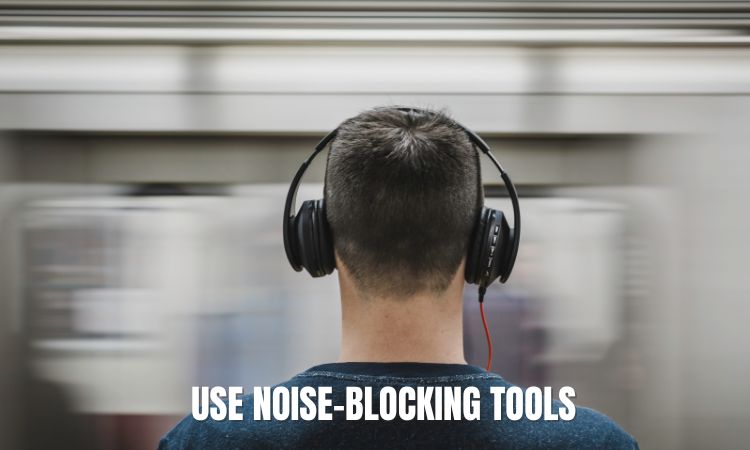
Incorporate Mindfulness Techniques for Noise Adaptation
While physical tools are essential, developing mental strategies can help you adapt to unavoidable noise and maintain restful sleep patterns.
Acceptance and Reframing
- Acknowledge the Noise: Instead of fighting the noise and getting frustrated, try to acknowledge its presence without judgment. Recognize that some level of noise is often unavoidable.
- Reframe Your Thoughts: Challenge negative thoughts about the noise disrupting your sleep. Instead of thinking “This noise is going to keep me awake all night,” try a more neutral thought like “There is noise, and I am doing my best to relax despite it.”
Relaxation Techniques
- Deep Breathing: Practice slow, deep diaphragmatic breathing to calm your nervous system and reduce stress triggered by noise.
- Progressive Muscle Relaxation: Systematically tense and release different muscle groups in your body to promote relaxation and reduce physical tension.
- Guided Imagery: Visualize a peaceful and quiet scene to shift your focus away from the external noise.
Focus on Internal Sensations
- Body Scan Meditation: Bring your attention to the physical sensations within your body, such as your breath or the feeling of the mattress beneath you. This can help anchor you in the present moment and distract from external sounds.
Consistency is Key
Practicing mindfulness techniques for noise adaptation regularly, even when the environment is quiet, can build your resilience to noise disturbances when they occur.
Frequently Asked Questions (FAQ)
Q: Are earplugs safe to use every night?
A: Generally, yes, sleeping with earplugs is safe for most people. However, it’s important to choose comfortable, non-irritating types and maintain good hygiene. If you experience ear pain or discomfort, discontinue use and consult a doctor.
Q: Can white noise machines be harmful?
A: When used at a reasonable volume, white noise machines are generally not harmful. Avoid setting the volume excessively high, as prolonged exposure to loud noise, even white noise, can potentially impact hearing. Ensure you can still hear important alarms.
Q: What if the noise source is within my own home, like a snoring partner?
A: Communicate openly with your partner about the issue. Solutions could include positional changes, nasal strips, or even consulting a doctor to rule out underlying sleep disorders. You can also use earplugs or a white noise machine to mitigate the sound.
Q: How long does it take to get used to sleeping with earplugs or a white noise machine?
A: It varies from person to person. Some individuals adapt immediately, while others may take a few nights to a week to get accustomed to the sensation of earplugs or the sound of a white noise machine. Consistency is key.
Q: Are there any natural alternatives to white noise machines?
A: Yes, natural sounds like a fan, the gentle sound of rain outside, or even специально curated calming music played at a low volume can serve a similar masking function for some individuals.
Conclusion
Achieving restful sleep in a noisy world requires a multi-faceted approach. By identifying and minimizing noise sources, utilizing effective noise-blocking tools like earplugs and white noise machines, and incorporating mindfulness techniques to adapt to unavoidable sounds, you can significantly improve your sleep quality and overall well-being.
Remember that consistency and patience are key as you implement these strategies. Prioritizing a calm sleep environment is an investment in your health, energy levels, and overall quality of life, paving the way for more peaceful and restorative nights.

